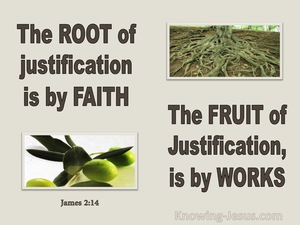◄ James Devotional Commentary ►
James 1:1
James was a half-brother of the Lord Jesus and could have boasted of their close family relationship or identified himself as a great leader of the Christian church. He was chairman of the Jerusalem council which started to lay the foundational doctrines of Christianity, but James did not boast of his parentage, position, or pedigree, but identified himself as a bondservant of God - a slave of the Lord Jesus Christ.
James read more...
James 1:2
Many believers think that our Christian life should be problem-free and devoid of trials, and yet Jesus warned that in this world we will have tribulation, while Paul also reminds us that we must, through much tribulation, enter into the kingdom of God.
James also wanted to explain that our personal trials are a test of our faith and the daily difficulties we face in life help to develop our Christian character and mature our read more...
James 1:3
So much in the Christian walk seems to be diametrically opposite to all that the Word of God says, and the suffering that we face in this world is no exception. We are told in many places the reasons and benefits of suffering, and are given many examples of people who faced severe trials in their lives, but who came through as gold. It may be Satan who throws suffering our way in an attempt to bring out the worst in us and shipwreck our faith in the Lord, but it read more...
James 1:4
Whether we are faced with fleshly temptations that rise up from our old sin nature or testing trials that come from above, we know that God takes all things and weaves them beautifully together for good, to those that love God and are called by grace through faith in Christ, according to His good purpose.
But how often we desire a life that is free from trouble and swimming in happy blessings. How often our pleading prayer is for read more...
James 1:5
It has been said that a knowledge of one's own ignorance is the beginning of wisdom and that recognising our lack of wisdom is a prudent step towards understanding. Scripture qualifies this by reminding us that the fear of the Lord is the beginning of wisdom and that a knowledge of the holy brings understanding.
Life is full of pitfalls and snares and we often make wrong choices, but it is comforting to know that no matter what read more...
James 1:6
The epistle of James was sent to Christians who had been scattered abroad as a result of persecution. James knew that the human response to the difficulties and dangers we face in life can either cause us to doubt God's goodness or increase our trust in His sufficient grace. He knew that disbelief in God's goodness and power during times of great problems and pain means a man or woman is unstable in their faith, resulting in them being buffeted and bruised by the read more...
James 1:7
Every child of God is called to mature in the faith and grow in their spiritual life... and throughout the New Testament we are taught that maturity in the faith is tested and established through trials and tribulations. If we are to grow in grace and in a knowledge of our Lord Jesus Christ, we are bound to go through various difficulties and dangers, trials and tribulations.
Peter reminds us that the testing of our faith is more read more...
James 1:8
We are told in Hebrews that without faith it is impossible to please God. Firstly, we must trust Him for salvation by grace through faith in Christ's finished work at Calvary. Secondly, as born-again Christians we must continue to believe in the truth of His Word, to trust in His many precious promises, and to have faith that He hears and answers prayer.
In his epistle, it seems that James is taking us on a spiritual journey. He read more...
James 1:10
There is much in Scripture that talks of money and wealth. We are not to store up riches on earth but to lay up treasure in heaven. We are exhorted to fix our hope on God Who supplies all things lavishly for us to enjoy. We are to not to place our trust in the uncertainty of this world's fleeting affluence, but in God's eternal promises to us.
read more...
James 1:11
As with all the apostles, the dear desire of James is to see all believers in Christ maturing in their faith, growing in grace, trusting God unwaveringly, and developing an ever-increasing faith in His gracious provision and sufficient grace. And yet he knows from experience that the Christian life, for both rich and poor, is full of trials, tribulations, difficulties, and distresses.
It is for this reason that James encourages read more...
James 1:12
It is trials and tribulation in the life of a Christian that refines our trust in God and increases our dependence upon the Lord. The personal difficulties and dangers that we face in our everyday life, and our reaction to the distresses and despair of others is often the determining factor of whether we hold fast to what we believe of Christ's sufficient strength OR whether we allow seeds of doubt to darken our hearts to the goodness of God. And when we doubt, we read more...
James 1:13
How quickly and easily God is blamed when we suffer some calamity or fall into sin. God should not have allowed this to happen, we murmur. God made me like this, so it's His fault, is our accusation. I couldn't help it, is often the excuse we make, when we fall into temptation and sin. But all the misery of the world, and the evil with which we are surrounded is rooted in sin, and whether it is self-inflicted or comes from the hands of another, never let it be said read more...
James 1:14
When we are tempted to sin, we must not forget that temptation never comes from the Lord but has its root in sin. Temptation comes to us through the outer enticements of the world and the inner lusts of the flesh. If we give into temptation we sin, but when we resist sin's evil bait, God turns that temptation into a meaningful trial which He uses for our greater good and His own glory.
Temptations and trials are the opposite sides read more...
James 1:15
All that is evil is of the devil and all that is good is of God. God will never tempt a man to sin, for God hates sin and cannot look upon sin, but God will often use temptation in a man's life to test his faith, patience, and perseverance, and the one that endures the test will glorify God.
Temptation to sin must never be seen as a sin. Christ Himself was tempted yet He never sinned, and we too can be tempted but do not need to read more...
James 1:16
We are warned in many places in Scripture not to be deceived, especially in the area of testing, trials, and temptation. We are not to be deceived about the source of sin and its consequences, and we are to be particularly careful of being led astray from the truth of God's Word into justifying our own, self-authenticated, ungodly acts and lustful pride. Instead, we need to take personal responsibility for our own words and actions.
read more...
James 1:17
God is good, and in the beginning He created the visible light of the sun, the moon, and all the heavenly bodies. He gave them for warmth, heat, and to brighten our pathway on earth. He also gave them to serve as signs for festivals and for days and years. Everything He did and everything He created was good - very good, and He chose to make man in His own image and likeness and to make man His personal representative on earth.
read more...
James 1:18
In the beginning, God created man in His own image, but man rebelled and all his progeny were imputed with sin. They became sinners by nature, estranged from God, and without hope in the world.
In these end times in which we live, God in His grace sent His Son to be the propitiation for our sin so that all who believe in Him might be made new creatures in Christ and become part of a new creation. And with each passing day, we are read more...
James 1:19
In this passage, James was writing to warn believers against self-deception. He gives them (and us) some practical, good advise on our conduct, in particular the way we speak, the way we hear, and the way we get angry.
First, James encourages us to be quick to hear. Too often in a conversation, we are just waiting for the other person to finish speaking so that we can jump in with our point of view or words of wisdom. In the read more...
James 1:22
In his epistle, James outlines the relationship between faith and works. He recognises that there are some that profess to be Christians who do not have a saving faith, but he is also aware that there are those that have a genuine saving faith but show little or no outward evidence of their justification. And so he admonishes all genuine Christians to be doers of the Word and not hearers only.
James seeks to distinguish between read more...
James 1:24
The first chapter of James is dealing with the subject of trials that are sent by God to strengthen our faith and sharpen our Christian resolve. It talks of temptations that come from the enemy, designed to trip us up or shipwreck our faith. James is teaching that God is the Author of all that is perfect and good and should never be blamed for the problems of life, for He is the One Who makes all things work together for the eternal good of those that are fitting read more...
James 1:25
Not a day should go past without the believer in Christ checking him or herself to make sure that they are in the faith and not tossed about by every doctrinal 'wind-of-change'. There should be a regular examination of one's biblical principles to ensure that we are not straying from the path of righteousness, becoming embroiled in legalist practices, or claiming that our liberty in Christ is a licence to sin.
read more...
James 1:27
There is a saying that Christianity is a relationship and not a religion, and in many respects this it true, but perhaps it would be more accurate to state what the Bible says - that Christianity is: "The only pure and undefiled religion in the sight of our God and Father."
Paul often writes about the "Jewish religion" and warns against the "religion of angels" as well as "self-made read more...
James 2:1
The maturing Christian must not only speak the truth in love, but practice their faith in every aspect of their life. We are to live the truth of the glorious gospel of Christ in each and every situation that may arise.
We are not simply to believe in a statement of faith with our intellectual mind, but we are to live out our personal, trusting faith in Christ in every aspect of our daily life. We do this by the way that we live, read more...
James 2:2
There is no shadow of turning with the Lord, and the elderly apostle Peter is one who rehearsed this truth with the fledgling Church at the first council in Jerusalem: "God shows no favouritism." Paul later reinforced this truth by reminding us: "There is no partiality with God," and warns: "Whoever does wrong will receive the consequences of the wrong which he has done, and that without partiality."
read more...
James 2:3
James is challenging his brothers in Christ to examine their motives to see if they are godly or hypocritical. He is pointing out that faith in our glorious Lord Jesus Christ should not reflect an attitude of personal favouritism, and then he goes on to give a brilliant example of hypocrisy that can be found in the lives of many Christians, even inside the doors of certain church fellowships.
He presents a church assembly where read more...
James 2:5
There is no partiality with God, for He is equally desirous to save the rich as the poor, the female as the male, the Gentile as the Jew, the old as the young. While the impartiality of God is perfect, it proves very easy for imperfect man to demonstrate a human preference towards people we consider well-to-do. The fleshly nature of man finds it easy to be biased in favour of those who are nice towards us, especially if they are wealthy and show generosity towards read more...
James 2:10
James reminds us: "Whoever keeps the whole law and yet stumbles in one point, has become guilty of all," which appears to be at odds with the teaching of Paul who insists that we are not under Law but under Grace.
On the surface, this verse appears to be contradicting the good news of the Gospel of Grace, and upholding the Law of Moses by teaching that breaking one part of the law makes a man guilty of all. read more...
James 2:13
The second chapter of James confirms an important Christian principle that Jesus established in His Sermon on the Mount - mercy will be extended to those that show mercy, while the merciless man will face God's judgement. Jesus explained this truth to his audience in Matthew: "Blessed are the merciful, for they shall receive mercy." James expresses the same principle from the opposing position: "For the one who has shown no mercy will be read more...
James 2:14
There are no contradictions in the Word of God, and yet many believers consider this letter of James to be at odds with the teachings of the apostle Paul, for James seems to be basing salvation on works while Paul clearly says, "Having be justified by faith we have peace with God."
James is emphasising that genuine salvation is based on works which can be observed by man, while Paul teaches that genuine salvation read more...
James 2:17
When reading the Bible, it is always important to identify the context in which it is written, or the person, group of people, or nation to whom it is addressed. James makes it clear, right at the beginning of his epistle, that he is writing his letter to Church-age believers. However, we also note that he particularly addresses those from "the 12 tribes of Israel - who had been scattered among the nations," during a time of severe read more...
James 2:19
James did not sugarcoat the gospel of God, nor did he pull his punches when teaching the truth... because he knew the serious and eternal consequences of rejecting the gospel of grace, or of feigning faith in Christ's finished work. Indeed, incredible, satanic deceptions, which distorted the truth of biblical salvation, started to flood into the Church in those early days, and has continued, unabated, into these end times.
One lie read more...
James 2:21
One of the most controversial verse in James, if not in the New Testament, is James 2:21 which states: "Was not Abraham our father justified by works when he offered up Isaac, his son, on the altar?" This verse has caused consternation in the Church and division in denominations. The question continues to rage and appears to contradict Paul's teaching that we are not justified by works, but by faith in the finished work of Christ on the read more...
James 2:26
In the final section of chapter 2, James presents a step-by-step argument on the essentials of our faith and the connection between faith and works. His teaching that we are justified by works appears to contradict that of Paul who insists we are saved by faith alone. But on closer inspection, we find there is no contradiction. Paul is referring to initial salvation, where we are justified in the eyes of GOD by our faith, while James read more...
James 3:1
The epistle of James was probably written by Christ's younger half-brother and is considered to be the first New Testament book to be penned. It appears to rely more heavily on Christ's own, pre-Cross teachings to Israel, rather than focussing on post-Cross revelation to the Church, which was mainly given through Paul and the other apostles of Christ.
However, there is much important teaching in this little letter that we would read more...
James 3:4
The tongue is a very small instrument but it can be extremely influential, both for good and for evil. In the book of Proverbs, we find many examples where the tongue can be used for good - but it also describes the harmful mischief-making and untold damage that a deceitful, gossiping, murmuring, or lying tongue can inflict on an innocent victim.
The tongues of the righteous can give great encouragement and instruction, help and read more...
James 3:6
Following Christ's Resurrection, James, the half-brother of Jesus, believed the gospel of grace and became the leader of the Church in Jerusalem. But throughout Christ's earthly life, James had been critical of his half-brother's ministry and at times, he mocked Christ's Messianic claims. Little wonder that much of the epistle of James touches on areas of Christian living that would be close to the heart of this repentant man who identified as a bond-slave of read more...
James 3:10
We are required by God to conduct our lives with godly wisdom and spiritual understanding, but the most unruly evil, which is incapable of being subdued by self-effort or rigorous training, is the taming of the tongue.
This little organ can produce the most beautiful blessings which give glory of God, while at the same time can pour forth the most un-sanctified filth and blasphemy which discredits His holy name. These things ought read more...
James 3:13
There is a significant difference between true wisdom and false wisdom; between wisdom from above and the wisdom of the world. The world too often equates wisdom with knowledge, but godly wisdom is given from above, as the Spirit of God directs the steps of a man and guides him in his actions and attitude.
Wisdom does not depend on how much knowledge a man manages to acquire but on how a man conducts himself in his everyday life. read more...
James 3:14
James had been calling believers to zealously guard their words and actions. He encouraged them to demonstrate this through both their righteous conduct and gentle wisdom. Being zealous for the things of God and having a passion for that which is honest and true is a good thing. However, when one's passion is diverted into egotistical self-seeking, or follows in an ungodly direction, it can have a devastating effect and so James warns: "But if you have bitter read more...
James 3:16
There are certain character traits that are earthly, fleshly, sensual, and demonic, and there are those that are heavenly, spiritual, holy, and godly. Only those that are born again believers who walk in spirit and truth, are enabled to display the good and godly attributes that come from above, through the power of the indwelling Holy Spirit.
Both unsaved sinners and carnal Christians who carry out the works of the flesh, can read more...
James 3:17
James was a man who gave the Church much good advice. He reminded believers that God is generous to all and will give wisdom willingly and uncritically to everyone who asks Him for it, in faith. He expands his treatise on wisdom by contrasting the wisdom of the world with the wisdom that comes from above, and pointing out that true wisdom is demonstrated by a man's good and gracious conduct, by his noble works, and by his gracious conversation. James also adds that read more...
James 4:1
Having just delivered an important paragraph about the qualities of being of a peacemaker... where sowing in peace is the key to raising a harvest of righteousness, James dives headlong into a stinging treaties on the detrimental effects of fights, quarrels, lust, hate, envy, and pride, within the Body of Christ.
The wise man is the one that pursues peace and speaks the truth in love, while the tragedy is that those who wallow in read more...
James 4:2
So much in Scripture points to right thinking. We are to take every thought captive to Christ. We are to let His mind dwell in us richly. We are to have this same attitude in ourselves that was in Christ Jesus. We are to look to the Lord Jesus as our example in selfless humility. We are to focus our thoughts on what is right in the sight of God and all people. We are to trust in the Lord with all our heart and not to lean on our own, limited understanding.
read more...
James 4:4
These are pretty tough words for any believer to receive from an author of the God-breathed Scriptures but nonetheless, they are contained within the canon of holy writ and need to be explored with an open heart that is not hiding behind a self-righteous exterior.
James, the brother of the Lord Jesus Christ, had a ministry to Jewish believers in Christ in the early Church, and this epistle is addressed to Christians from the 12 read more...
James 4:5
We are called into the unity of the Spirit in the bond of peace, but too often there is strife and acrimony among believers and feuds between Christian workers or groups of believers. James identifies the cause of conflict as being pride and self-elevation, or a desire to excel in the midst of one's brothers and sisters in Christ, or the thrill of worldly applause.
This is not how the Body of Christ should function, for it read more...
James 4:6
James desires to get some important truths across to his fellow-Christians. He seeks to warn us against favouritism, to remind us of the dangers of an unruly tongue, to encourage us to seek wisdom from the Lord, and to avoid the devastating danger of pride which manifests itself in covetous cravings and evil desires. He exhorts us to remember that Scripture teaches that the indwelling Spirit of God yearns over each of us with a godly jealousy that desires that we read more...
James 4:7
As Christians, we are not under law but under grace. As God's children who are saved by grace through faith in Christ, we can walk in spirit and truth OR we can live our life in the lust of the flesh. We can yield to the work of the Holy Spirit within OR we can submit to the evil influences of Satan.
As believers, we can allow sin to rule and reign in our mortal body and give in to the sinful desires of our fleshly nature OR we read more...
James 4:8
Christians are eternally united to Christ by faith. We become a child of God and are positioned in Christ at rebirth. At salvation, we receive the indwelling Holy Spirit as a guarantee of our eternal life and heavenly inheritance until the redemption of the purchased possession - until we are raptured into His presence. There are many precious promises that become ours, the moment we trust in Christ as the sacrifice for our sin.
read more...
James 4:9
In a few consecutive verses, James fires a series of short, sharp instructions on how to live a victorious Christian life. A number of his commands are linked together with contrasting concepts, which unite to teach valuable lessons. Submit to God. Resist the devil. Draw near to the Lord. Cleanse your hands. Purify your hearts: "Lament and read more...
James 4:10
Not only is salvation given to all who believe on the Lord Jesus Christ as a free gift of God's grace, but His ongoing favour is readily available to every believer, as we journey along the path of life.
Having been born again of the Spirit, we are called to trust in the Lord with all our heart, and we also have a biblical responsibility to walk in His ways and humble ourselves before His face, as outlined in the epistle of read more...
James 4:11
The tongue is a tiny member of the body, but its ungodly use can cause real damage. James lays out the principles and practice of godly speech. He not only warns against 'speaking evil' but explains that 'evil speech' is a sin: "Do not speak against one another," he warns us, "He who speaks against a brother or judges him, speaks against the law. He judges the law. And if you judge the law, you are not a doer of the law but a judge of it."
read more...
James 4:14
There are two groups of people living in this world today; those that are saved and those that are lost; those that are for Christ and those that are against Him. There are two creations living side by side; those with their feet firmly fixed in the old creation in Adam (who are part of the kingdom of darkness), and those with their hearts resting in heavenly places in Christ Jesus (who are part of the kingdom of light and have been born again into the new creation read more...
James 4:15
The book of James is filled with wisdom, providing us with much-needed insight into how to live our lives in a God-honouring way. In James 4:15 we are reminded of the importance of submitting our plans and desires to God’s will. James tells us to consider the brevity of life, and how quickly our plans can change. We may plan to go on a trip or embark on a business venture, but none of us knows what the future holds. He read more...
James 4:17
The Word of God is not only our plumb-line for truth but also should be our handbook for life and living. All Scripture has been written for our learning, but the New Testament epistles give specific guidance and instruction on living the Christian life in this Church dispensation.
God has given us all we need for life and godliness, and we have been given the holy Scriptures which provide clear teaching on how to walk in spirit and truth and why we read more...
James 5:6
There are many passages in the Bible that bewail the seeming prosperity of ungodly, rich tricksters, while the people of God seem to be mercilessly exploited and defrauded by them in every area of life. But James addresses the issue of social justice in this part of his epistle and he does not pull his punches as to his severe denunciation of their immoral ways, while outlining the final, fatal outcome of their iniquitous lives.
read more...
James 5:7
James starts to bring his letter to a close with an exhortation to patience: "Therefore, be patient, brethren," he pleads, "be patient until the coming of the Lord. Be patient like the farmer who waits for the precious produce of the soil and remains patient until the field receives the early and late rains."
At the beginning of his epistle, James called his fellow believers to be read more...
James 5:11
The apostle James touches on many issues that affected persecuted Christians in the early Church. Topics in James relate to unity in the Body of Christ as well as faith, wisdom, conflict, justice, and prayer.
But one issue that seems to thread its way throughout his epistle, and which is equally relevant for Christians today, touches on the need for unquestioning, patient-endurance during difficult trials and tribulations - and read more...
James 5:13
Prayer and praise are two vital elements in the Christian life, and yet they are perhaps the two essential components of a believer's spiritual walk that are most frequently lacking.
Too often, prayer and praise have been infiltrated with new age philosophies, tainted with occultic thinking, or simply infused with a worldly mindset. And yet, godly living through read more...
James 5:14
Prayer is a great privilege for the Christian, for it affords us an audience at the throne of grace, for mercy to find help in time of need. And the book of James both begins and ends with the 'prayer of faith'.
At the beginning, we are warned against being a double-minded Christian, where we pray with doubt in our hearts, and right at the end of his letter we discover that the effective, fervent prayer of the righteous man, has read more...
James 5:16
As James draws his epistle to a close, we are called to confess our trespasses to one another and to pray for each other, knowing that the effective prayer of a righteous man can accomplish much.
This call to confession is not a summons to the confessional box where a 'priest' becomes a middleman between us and God, for there is one God and one Mediator between God and mankind, the Man Christ Jesus. He alone is the one to Whom we read more...



























































